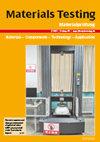Production and characterization of waste walnut shell powder that can be used as a sustainable eco-friendly reinforcement in biocomposites
IF 2.4
4区 材料科学
Q2 MATERIALS SCIENCE, CHARACTERIZATION & TESTING
引用次数: 0
Abstract
The rapid depletion of natural resources and the increase of environmental problems due to production-related waste necessitate sustainable waste management. In particular, reintroducing by-products and waste generated by agricultural activities into the economy is critical to reduce environmental pollution, solve the storage problem, and promote sustainability. Agricultural wastes such as fiber, husks, cobs, stalks, straw, dust, and particles are recyclable and can be innovatively reused in various sectors. One of the innovative fields where sustainable agricultural waste management can be implemented is the development of biocomposites. One of the most important steps in the production of biocomposites reinforced with agricultural waste is processing the waste biomass and making it usable as a reinforcing element. This study investigated the production of powder reinforcements for biocomposite material from the biomass of walnut shells using a ring mill. The walnut shells, mechanically reduced in size, were first dried at 100 °C for 3 h and ground at four different grinding times (10, 20, 30, and 40 min). Afterward, the waste walnut shell powders were subjected to sieve analysis and precise weight measurements. Then, the waste walnut shell powders, which were dried at 100 °C for 3 h and ground for 40 min, were subjected to a second drying process at 100 °C (60, 180, and 300 min) and ground again for 40 min. Then, the resulting waste walnut shell powders were subjected to sieve analysis, precision weight measurements, and microscopic, and SEM analyses to determine the characterization of the powders.可用作生物复合材料中可持续生态友好型加固材料的废弃核桃壳粉末的生产和表征
自然资源的迅速枯竭和与生产有关的废物所导致的环境问题的增加,使得可持续废物管理成为必要。特别是,将农业活动产生的副产品和废物重新引入经济领域,对于减少环境污染、解决储存问题和促进可持续发展至关重要。农业废弃物,如纤维、谷壳、棒子、秸秆、稻草、灰尘和颗粒等,都是可回收的,可以创新性地重新用于各个领域。可持续农业废物管理的创新领域之一是开发生物复合材料。利用农业废弃物生产增强生物复合材料的最重要步骤之一是加工废弃生物质,使其成为可利用的增强元素。本研究调查了使用环形磨粉机从核桃壳生物质中生产生物复合材料粉末增强材料的情况。核桃壳经机械粉碎后,首先在 100 °C 下干燥 3 小时,然后以四种不同的研磨时间(10、20、30 和 40 分钟)进行研磨。然后,对废弃核桃壳粉末进行筛分分析和精确的重量测量。然后,在 100 °C 下干燥 3 小时并研磨 40 分钟的废核桃壳粉末在 100 °C 下进行第二次干燥处理(60、180 和 300 分钟),并再次研磨 40 分钟。然后,对所得废核桃壳粉末进行筛分分析、精密重量测量、显微镜和扫描电镜分析,以确定粉末的特性。
本文章由计算机程序翻译,如有差异,请以英文原文为准。
求助全文
约1分钟内获得全文
求助全文
来源期刊

Materials Testing
工程技术-材料科学:表征与测试
CiteScore
4.20
自引率
36.00%
发文量
165
审稿时长
4-8 weeks
期刊介绍:
Materials Testing is a SCI-listed English language journal dealing with all aspects of material and component testing with a special focus on transfer between laboratory research into industrial application. The journal provides first-hand information on non-destructive, destructive, optical, physical and chemical test procedures. It contains exclusive articles which are peer-reviewed applying respectively high international quality criterions.
 求助内容:
求助内容: 应助结果提醒方式:
应助结果提醒方式:


